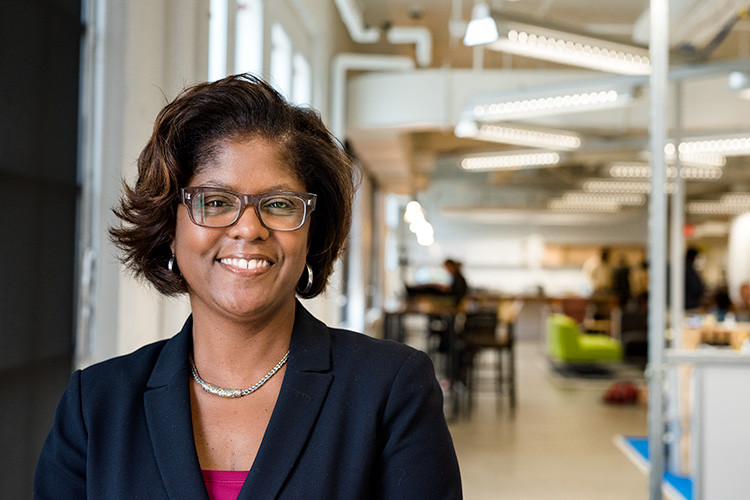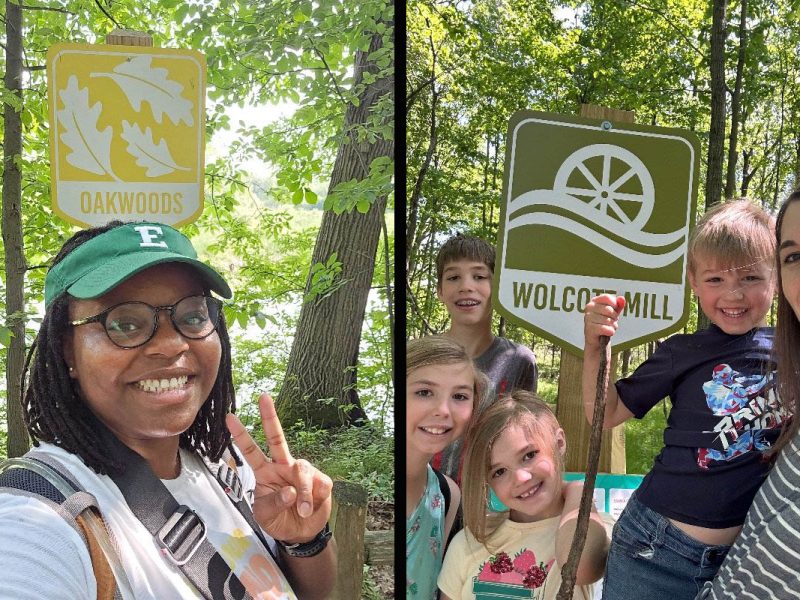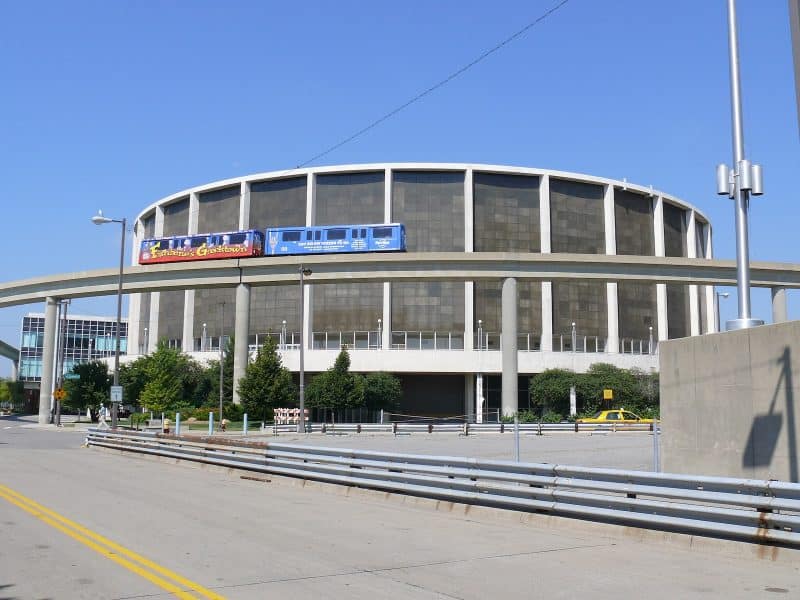Pamela Lewis
Pamela Lewis is the Director of the Detroit-based New Economy Initiative, the largest philanthropically led economic development initiative in the United States.

Between 2000 and 2010, 50% of all the jobs lost in the U.S. were in Michigan. During the peak of the recession, from 2007-2008, the idea that the City of Detroit would become one of the best cities in the country for aspiring entrepreneurs with some of the most robust resources available for small businesses was outright laughable.
Pamela Lewis remembers that time, and she remembers thinking that very same thing when she first heard about the New Economy Initiative (NEI).
“I was at NextEnergy when NEI started and was one of the people who said, ‘TechTown expects to see how many people in their entrepreneurship program?'” she laughs.
Lewis is now the Director of NEI, though she calls her path one of “accidental leadership.”
“I didn’t get out of college saying, ‘Oh, I want to be a strategic grantmaker for entrepreneurship,'” she says.
Her background is in engineering. She worked at DTE Energy for 16 years, and in the early 2000s she stepped away from that in search of different types of work, which brought her to NextEnergy to work as program director of the state-funded entrepreneurship program that provided technical support and advice within the clean energy space to state-funded accelerators throughout Michigan.
“This is where I first stumbled into economic development and philanthropy,” Lewis recalls. “I hadn’t been exposed to that before. There I discovered there is this interesting role philanthropy plays in economic development.”
When NEI launched in 2007 as a collective of 10 local and national foundations (there are now 12 involved) pulling $100 million in philanthropic grant dollars together in a way that would influence the economy by betting on entrepreneurship, there was very little in the way of existing resources for entrepreneurs and even less in terms of public dialogue around entrepreneurship. Programs and accelerators that did exist at the time were in their infancy compared to what they have since grown into, and entrepreneurship was still very much a gamble – both in terms of funding and in terms of convincing people that entrepreneurship is a valid pathway to personal income generation.
“‘Entrepreneurship’ used to mean you didn’t have a job,” Lewis says. “That has changed. The groundwork we’ve done creating programs and providing options for people to pursue entrepreneurship as a path for income generation has helped to change that perception.”
The 10 founding philanthropic organizations had a goal of creating diversity in Detroit, at that point known as a single-sector industry town, and change the mindset around work and income generation so that people understood that entrepreneurship is a viable path. Initially they did this by making grants to existing development strategies and programs, working with established programs in the economic ecosystem like the Build Institute, Ann Arbor SPARK, and TechTown Detroit to enable them to do the great work they do in an expanded way.
“The culture as it relates to entrepreneurship in this region has changed,” Lewis declares. “You can’t pick up a newspaper without reading a story celebrating it, and there’s no archetype for it – these entrepreneurs are different ages, different genders, and different races. The idea of entrepreneurship has become a point of inspiration and hope, so now people realize they don’t have to wait for the big companies to employ them.”
NEI is the largest philanthropically led economic development initiative of its kind in the United States. NEI’s “impact by the numbers” – which is outlined in a short video here and is further detailed in a recently-released report available here – includes $96.2 million in grants awarded to organizations supporting entrepreneurs, $2.9 billion in real output of Southeast Michigan companies that have benefitted from NEI support, and 17,490 jobs created as a result of NEI-funded efforts.
One of the first grants made by NEI was to Detroit’s TechTown, a business incubator and accelerator that proposed the then-radical idea of introducing a “whosoever may come” concept of entrepreneurship to the community, one not just focused on tech startups – both then and now the darlings of the startup/small business world – or scientists and researchers straight out of universities, but supporting the concept of entrepreneurship for people who didn’t necessarily have those types of backgrounds.
Lewis was hired on by the Kauffman Foundation to oversee the work they were doing with NEI. During that period, TechTown was fast-tracking thousands of people through their entrepreneurship programs.
“Not all of them were creating businesses, but I don’t know if that even matters,” she says. ” They were fast-track training anyone who wanted to pursue entrepreneurship – people out of work, people looking to transition careers, people who were unemployed for a long time.”
Ultimately Lewis was hired on as the Senior Program Officer on the NEI team in 2011, and was named Director in January of this year.
“It was an opportunity to do what I call worthy work,” she says.
Lewis describes the New Economy Initiative as being “agnostic” as to what industry the startups are in and what stages they are at.
“We don’t care whether they are the mad scientists or the small entrepreneurs,” she says. “They don’t all have to be tech. They can be the coffee shop owner as well the person selling fashion all the way to the person with next cure for cancer. We also strive to make entrepreneurship more comfortable for women and people of color in this town.”
Inclusion, she says, is a major focus of NEI’s grantmaking.
“High-tech, high-growth businesses are so important but there are too many existing small bushiness in these communities that also deserve support,” she explains. “They reinforce each other, the mom-and-pop independent businesses and the high-tech, high-growth businesses. [The latter] are the ones attracting talent but those people need a place to go get their coffee, eat, and shop, get services. We want people to feel comfortable living in commercial corridors. And it’s not just about them; it’s also about giving people who have been living here for the long-haul these opportunities.”
Program’s like the Build Institute, TechTown’s SWOT City, and ProsperUS were offering small business support and capacity-building in the neighborhoods of Detroit, so three years ago NEI launched NEIdeas, a two-tiered challenge designed to further support the efforts of such programs by awarding $500,000 to existing businesses in Detroit, Highland Park, and Hamtramck to continue to grow their ideas.
“NEIdeas is an example of NEI’s role not just in making grants for programs that exist but bringing new programs to market,” says Lewis. “NEIdeas was the perfect type of program that could really draw out all those business owners who really weren’t sure these types of programs are for them. The idea of the competition was a very low barrier to entry, with 30 businesses receiving $30,000 each and two at a certain scale receiving $100,000.”
2016 is the final year for NEIdeas, and grantees will be announced at the NEIdeas gala on November 20. In 2014 and 2015, NEIdeas granted over $1 million in cash to more than 60 existing businesses. But more importantly than that, Lewis says, is the network around entrepreneurship that has been built around this grant challenge that continues to support these existing entrepreneurs.
“There are 1,800 existing businesses in Detroit, Highland Park, and Hamtramck that are three years old or older, and now all of them are getting information about programs that are available to them and are getting assessed for what provider is best for them,” she says.
There are also free workshops, dozens of lawyers from Ford Motor Company who offer small business consultation and services on a volunteer basis, and a built-in network of local entrepreneurs and economic and business development programs that can be leveraged to, as they say, lift all boats.
“Worthy people won the prizes but what happens with the participants is the most important aspect of NEIdeas, because these businesses support the economic pipeline in the neighborhoods,” says Lewis. “The secret sauce of NEIdeas is not about the winners but about what happens to everyone else who applies. It’s easy for people to think NEIdeas is all NEI does, and that’s wrong, but it tells a better inclusion story than anything else we’ve done.”
This profile was originally published by Urban Innovation Exchange in partnership with Meeting of the Minds and Kresge Foundation. For more stories of people changing cities, visit UIXCities.com and follow @UIXCities.





